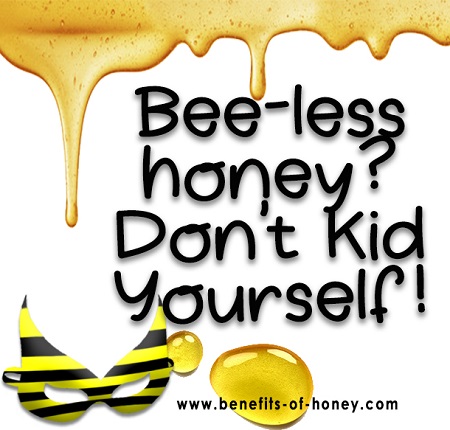bee-less honey
Bee-less Honey? Stop Fooling Yourself!
Recently, an article was published with this title:

Bee-less Honey Coming Soon? US Start-up MeliBio Creating a Buzz with Vegan Alternative

This American company, MeliBio announces to the world that they have invented a synthetic bio technology to replace honeybees for honey production, and the product launch is slated for late 2021.
Bee-less honey? You can offer vegans with an alternative sweetener, but please do NOT confuse people by calling the product honey if it does not involve the bees. Only bees can make honey. No bees, no honey. If the label “honey” must be used to entice consumers, you will need to first change the definition of honey given by all the English dictionaries in this world.
The article goes on to make the product’s unique selling point:
According to MeliBio, honey production in its current form is damaging to bees and their ecosystems, especially to the 20,000 wild and native bee species that endure immense pressure from commercial beekeeping.
By producing real honey with the help of science, MeliBio claims to be “revolutionizing the industry to help save 20,000 wild and native bee species that are essential to Earth’s flora and fauna.”
This bee-less honey is NOT going to save the bees. The root of the problem of the Colony Collapse Disorder which has caused a serious decline in honeybee populations, is NOT honey production, but synthetic chemicals and pesticides that destroyed the bees’ immunity to viruses, bacterial and fungal pathogens. MeliBio could perhaps think of how to help take down the real culprit, the bees’ enemies, with their advanced technologies instead?

MeliBio seems to think that beekeepers and honey consumers are evil people who steal food from the bees. But, honeybees are part of our Nature’s ecosystem to pollinate crops and produce honey. They are genetically coded to produce far more honey than they can eat, which is why beekeepers can take huge quantities of honey from healthy hives and still leave them with plenty to survive on.
Well, like many businesses which are producing “bee’s honey without the bees” (such as “sugar-free honey”, “honey sauce”, one even blatantly calls it “imitation honey”), MeliBio may have succeeded in making a product that people will not be able to distinguish from bees’ honey. But, I always like to say this:
“The best labs can create synthetic liquids that look and taste like real honey and even have the same glucose-fructose molecular structure, but NEVER can they fake something that works the same as real honey for our health and well-being. Because the bees have added a MYSTERIOUS GOODNESS of their own that can never be comprehended by the most ingenious mind or counterfeited by the most advanced technology.”
Ruth Tan
“The flowers are full of honey, but only the bee finds out the sweetness.”
Johann Wolfgang von Goethe
Israel’s Bee-Free Honey
Following the steps of MeliBio, which invented bee-less honey, the Land of Milk and Honey, Israel announced to the world in September 2022 that they have succeeded in replicating the protein from a synthetic bee’s stomach and combining it with plant nectar to produce bee-free honey, also all in the name of solving the world’s environmental crises. It was reported that Israel’s 529 licensed beekeepers, tending to 120,000 hives, only produce around 3,500 tons of honey per year. And now with this invention, three tonnes of honey can be produced each week without involving a a single bee.
Yet another brilliant invention. I mean it. But, please don’t use the term “honey” for this product. No matter how successfully it’s genetically engineered, what is produced from a “synthetic bee’s stomach” will still be synthetic. If “honey” must be used in marketing it, then call it “fake honey”.
Related Articles on Bee-less Honey
1. Are you really eating real honey? Watch out, labels and claims on honey jars can get really wild and crazy! More in: Eating Real Honey?
2. Trying to make sense out of food labels? How much is truth and how much is pure marketing tactics? Read: Did You Know Reading Food Label Can Be So Tricky?
3. The honeycomb theme has gone popular with foods such as chocolates, candy, cakes, and even sugar. Read: World of Honeycombs.
4. A book exposing the lies, deceptions and myths underneath the labels of honey: Honey Are You For Real?
5. Any thoughts from this comics strip? My Honey is Real.
End of “Bee-less Honey? Stop Fooling Yourself!”. Back to “Eating Real Honey?”